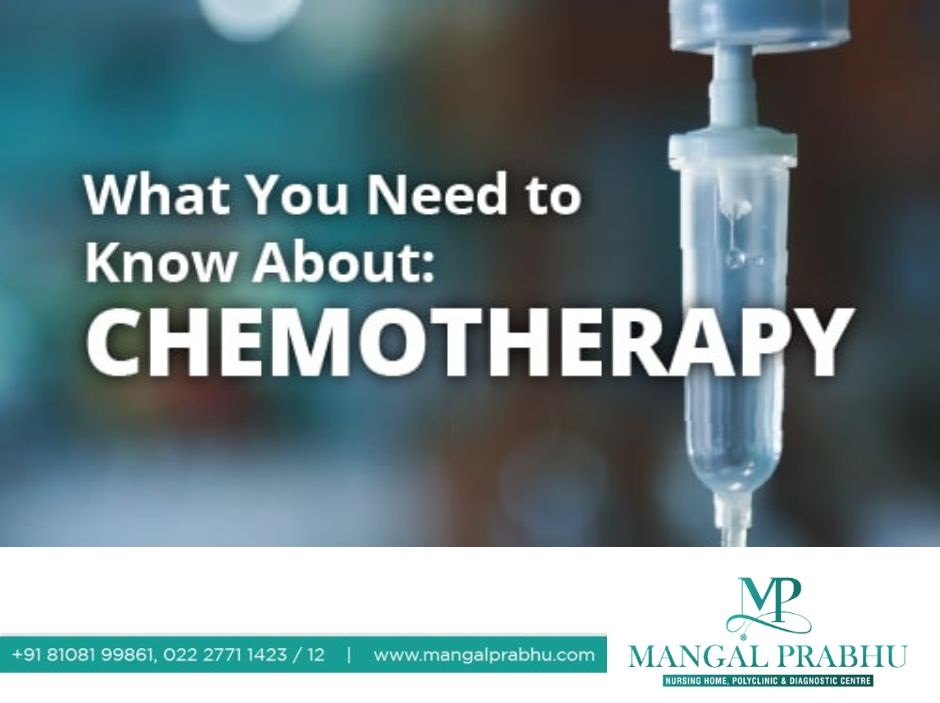
What you need to know chemotherapy?
Chemotherapy is a drug treatment that uses powerful chemicals to kill fast-growing cells in your body.
Chemotherapy in Juinagar, Navi Mumbai is most often used to treat cancer, since cancer cells grow and multiply much more quickly than most cells in the body.
Many different chemotherapy drugs are available. Chemotherapy drugs can be used alone or in combination to treat a wide variety of cancers.
Though chemotherapy is an effective way to treat many types of cancer, chemotherapy treatment also carries a risk of side effects. Some chemotherapy side effects are mild and treatable, while others can cause serious complications.
What to Expect When Having Chemotherapy:
Each chemotherapy treatment plan is created to meet a patient’s unique needs. But before treatment starts, you can expect to take these general steps.
Meet with your oncologist. The doctor will look over your medical records and do a physical exam. You will also have tests done to help plan treatment. Your exact treatment depends on the type, size, and location of the cancer. Your oncologist in Nerul, Navi Mumbai will also consider your age, your general health, and other factors, such as previous cancer treatments.
Learn about your chemotherapy treatment schedule. Your health care team will explain when and how often you need chemotherapy. Most chemotherapy treatments are given in repeating cycles. The length of a cycle depends on the drug(s) you receive. Most cycles range from 2 to 6 weeks. The number of treatment doses scheduled within each cycle also depends on the prescribed chemotherapy.
Learn how food and medicine can affect chemotherapy. Your health care team will tell you if there are restrictions or suggestions about what to eat and drink on chemotherapy days. This will help your treatment work best. Always tell your chemotherapy team about any prescription and non-prescription medicines you take.
Common side effects:
The side effects you experience while on chemotherapy depend on which drug or combination of drugs are prescribed. Different drugs cause different side effects. And each person’s experience is different. People may not experience the same side effects even when taking the same drug. And you can have different side effects than you did in the past if you take the same drug again.
Fatigue. Fatigue is feeling tired or exhausted even if you get enough sleep. It is the most common side effect of chemotherapy.
Pain. Chemotherapy sometimes causes pain. This can include:
- Headaches
- Muscle Pain
- Stomach pain
- Pain from nerve damage, such as burning, numbness, or shooting pains, usually in the fingers and toes.
Mouth and throat sores. Chemotherapy can damage the cells inside the mouth and throat. This causes painful sores in these areas, a condition called mucositis. Mouth sores usually happen 5 to 14 days after a treatment. It is also important to watch for infection in these sores.
Diarrhea. Some chemotherapy causes loose or watery bowel movements. Preventing diarrhea or treating it early helps keep you from getting dehydrated (losing too much body fluid). It also helps prevent other health problems.
Constipation. Chemotherapy can cause constipation. This means not having a bowel movement often enough or having difficult bowel movements.
Nausea and vomiting. Chemotherapy can cause nausea (feeling sick to your stomach) and vomiting (throwing up). Whether you have these side effects, and how often, depends on the specific drugs and dose.
Blood disorders. Your bone marrow is the spongy tissue inside your bones. It makes new blood cells. Chemotherapy affects this process, so you might have side effects from having too few blood cells.
Most side effects go away after chemotherapy is complete. But some continue or come back, or develop later. For example, some types of chemotherapy may cause permanent damage to the heart, lungs, liver, kidneys, or reproductive system. And some people have trouble with thinking, concentrating, and memory for months or years after treatment. Cancer survivors also have a higher risk of second cancers later in life.
Children who had chemotherapy are at risk of specific side effects that happen months or years after treatment.
Outlook
The outlook for an individual receiving chemotherapy will depend largely on the type, stage, and location of the cancer and a person’s overall health. In some cases, complete remission is possible. Mangal Prabhu is the best chemotherapy center in Navi Mumbai.
There can be adverse effects, however, and people may need to adjust their lifestyle or work routine during treatment. However, these usually resolve after treatment finishes.
